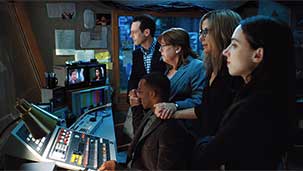Forgive me if I don’t know where to send this letter, but you’ve been incommunicado since Stephen Harper’s slaughter at the hands of the Liberal Party on October 19th. Can’t say I blame you. Running a federal campaign is an exhausting (and mostly thankless) task. Regardless of the result, it should conclude with a well-earned rest. Hell, just watching it was a pretty tiresome, despite the occasional laugh and a not-so-predictable ending.
But those aren’t the only things the Canadian election had in common with Our Brand Is Crisis.
It’s no secret that your campaign unraveled and you were unceremoniously dumped by the outgoing PM the day after his crushing defeat. But in 2011, you were celebrated as the brains behind Stephen Harper’s triumphant majority win. You were known as an Alpha: a rigid, on-message task-master. You were powerful. You were feared. You were employed. Now you’re...well, where are you? If you were campaign specialist “Calamity” Jane Bodine, the protagonist of Our Brand Is Crisis, you’d be licking your wounds in a mountain cabin, far away from the addictive pull of politics.
Like your campaign, Our Brand Is Crisis had a lot of early buzz. But, like your campaign, it fizzles quickly. We learn Jane’s backstory through the lazy device of a newspaper-clipping montage during the credits; a once-shining star on the campaign trail cut down by a drinking problem, mental instability, and hubris, Jane spends her days making unremarkable pottery in the middle of nowhere. An opportunity to make a comeback of sorts by working on the campaign of a conservative former president seeking re-election in Bolivia – and a chance to face her long-time nemesis – brings her out of retirement.
Maybe it’s because people around the world seem to know as much about Canada as they do about Bolivia, but the similarities between their quasi-fictional election and ours were eerie. Jane’s candidate, Castillo, is a cold, unpopular conservative who seems physically incapable of relating to his electorate. His previous presidency was rife with corruption and controversy. His first, ludicrously-staged campaign ad is comically bad. The opponent he wants to beat is Rivera, a universally loved man of the people running on the promise of “hope and change”. At one point Jane even exclaims, “his hair is amazing!” The strategy she comes up with is to run Castillo’s campaign on fear. “You can’t change the man to fit the narrative, so we’ll change the narrative to fit the man.”
If I were you I’d seriously consider seeking a retroactive consulting fee from the film’s producers.
Ever since the West Wing, it seems that stories about behind-the-scenes political machinations feel the need to keep up a breathless, Sorkin-esque pace that can be both false and exhausting. Refreshingly, Our Brand Is Crisis (loosely based on the documentary of the same name) tries to operate more at the pace of Primary Colours or The War Room, films which put the spotlight on the people behind the candidates. By now audiences understand that the inner sanctum of any government is full of huge personalities, massive egos, and more than a little bit of insanity. But after the wacky hijinks and cutthroat back-room dealings are done, we aren’t left with characters who have much depth—or a story with anything fresh to say.
Jane’s rival, Candy, is a slimy D-bag played by Billy Bob Thornton in a role he seems to have been born to play…over and over again. Their rivalry began years ago when Jane, working for a mayoral candidate, still had morals. Morals that were dashed by a tragedy for which she may or may not have been responsible. Now Candy is working for Rivera, and his passive-aggressive, back-and-forth practical jokes with Jane fuel much of the anemic narrative. The Bolivians are the great unwashed, their struggles only important inasmuch as they provide Jane the opportunity to spout bromides like a random quote generator. Politics is a dirty game, not for the meek or idealistic. Yeah, we know.
But hey, maybe those pedestrian tactics work. You were known to pull out a picture of yourself as a little girl, standing proudly beside your father with a freshly killed deer at your feet, to remind Conservatives that they were fighting for people outside of the Ottawa bubble. But some insiders now think that, beyond your bullish personality, the fact that you are a woman may have lead to your ultimate demise. Early scuttlebutt surrounding Our Brand Is Crisis focused on the fact that the role of Jane was originally written for a man, then Bullock lobbied to star in the lead. But producers Grant Heslov and George Clooney and writer Peter Straughan (working from Rachel Boynton’s doc) seem content to merely swap out the genders instead of adding any unique layers to Jane. They missed an opportunity to explore the challenges inherent when a difficult woman is in charge of getting an unworthy man elected.
Politics and the film business have some distinct parallels: it takes a whole team of dedicated people to get a project done, and when it fails, it’s far too easy to blame one person. In the case of Harper and Our Brand Is Crisis, neither team seemed interested in delivering something new, and in the end, the message just didn’t sell.
Power to the People,
Di







